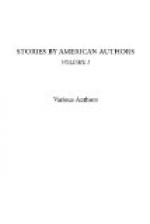* * * * *
The telegraphic column of a New York newspaper gave the story next morning, in the conventional manner, as follows:
“Henry Barwood, a treasury clerk, was killed yesterday at the Holbrook estate near Washington, by the discharge of a pistol in his own hands. The shooting is thought to have been accidental, although he had been ill and depressed for some days, and is said to have shown symptoms of insanity on former occasions.”
BALACCHI BROTHERS.
BY REBECCA HARDING DAVIS.
“There’s a man, now, that has been famous in his time,” said Davidge, as we passed the mill, glancing in at the sunny gap in the side of the building.
I paused incredulously: Phil’s lion so often turned out to be Snug the joiner. Phil was my chum at college, and in inviting me home to spend the vacation with him I thought he had fancied the resources of his village larger than they proved. In the two days since we came we had examined the old doctor’s cabinet, listened superciliously to a debate in the literary club upon the Evils of the Stage, and passed two solid afternoons in the circle about the stove in the drug-shop, where the squire and the Methodist parson, and even the mild, white-cravated young rector of St. Mark’s, were wont to sharpen their wits by friction. What more was left? I was positive that I knew the mental gauge of every man in the village.
A little earlier or later in life a gun or fishing-rod would have satisfied me. The sleepy, sunny little market-town was shut in by the bronzed autumn meadows, that sent their long groping fingers of grass or parti-colored weeds drowsily up into the very streets: there were ranges of hills and heavy stretches of oak and beech woods, too, through which crept glittering creeks full of trout. But I was just at that age when the soul disdains all aimless pleasures: my game was Man. I was busy in philosophically testing, weighing, labelling human nature.
“Famous, eh?” I said, looking after the pursy figure of the miller in his floury canvas round-about and corduroy trowsers, trotting up and down among the bags.
“That is one of the Balacchi Brothers,” Phil answered as we walked on. “You’ve heard of them when you were a boy?”
I had heard of them. The great acrobats were as noted in their line of art as Ellsler and Jenny Lind in theirs. But acrobats and danseuses had been alike brilliant, wicked impossibilities to my youth, for I had been reared a Covenanter of the Covenanters. In spite of the doubting philosophies with which I had clothed myself at college, that old Presbyterian training clung to me in everyday life close as my skin.




